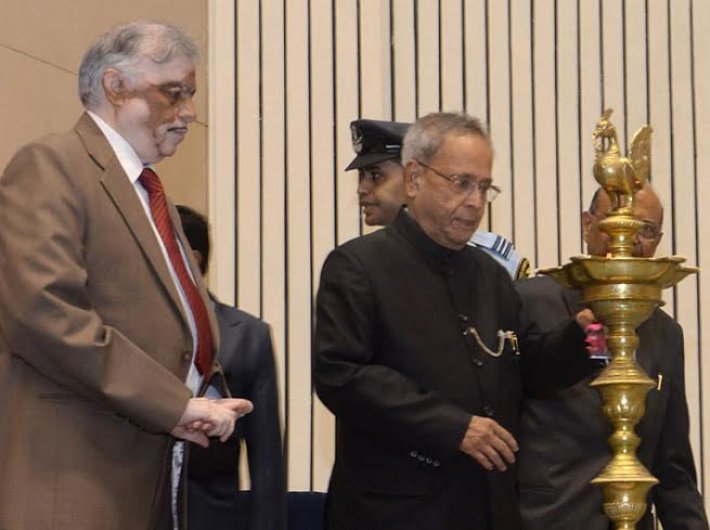Sathasivam might be extremely well-meaning and the best candidate for the job, but that is not reason enough to jeopardise propriety of his earlier post or risk judicial independence
In about 19 hours, P Sathasivam, the chief justice of India till April 26 this year, will take oath as the next governor of Kerala. The swearing-in ceremony is scheduled for 10 am tomorrow (September 5) but the 65-year-old has set off a debate bigger than the one spawned by the, first, appointment, and, subsequently, resignation of his predecessor Sheila Dikshit, who reportedly checks out of Raj Bhavan in Thiruvananthapuram today.
Predictably, it has become a BJP versus Congress, and slowly everyone else as well, slugfest. Like all decisions, appointments, resignations or removals in the 10-year UPA administration became a Congress vs BJP and everyone else tussle.
So, what’s the problem if, as the BJP says, there’s nothing in the constitution that “technically” can bar Sathasivam’s appointment? A lot. Ethical, for one. Juridical, for another.
Here are three reasons why Sathasivam should have said “well, thank you but no, thank you” to the NDA government’s offer to put him up at Thiruvananthapuram Raj Bhavan:
1. While the post of a governor is largely, well, insignificant, Sathasivam’s last post was anything but that. As many, including lawyers in Kerala and the all-India bar association, have pointed out, it’s beneath the dignity of a former chief justice of India (CJI) to hold a governor’s post, which comes much lower in the constitutional hierarchy. For the record, the CJI is the fourth highest position in the country, preceded only by the president, the vice-president and the prime minister.
So, Sathasivam might be extremely well-meaning – and there’s no reason to disbelieve that – and he could be the best candidate for the job, but it’s not his personal characteristics and hallmark that is important here. It is the dignity and propriety of the position he held earlier that should be the consideration.
2. There’s a good reason why the election commission wants a “cooling-off” period for even government servants before they can join electoral politics. There are even advocates for extending a similar one-year cooling-off period (as laid down in the all-India service rules) before retired bureaucrats can take up a job in the private sector (read an earlier story on that here). The word is conflict of interest.
Governors are nothing if not political pawns, and the CJI’s is way, way more important a position than a bureaucrat’s. So there’s little reason to believe conflict of interest is an impossibility from this precedent – Sathasivam is the first former CJI to be appointed a governor; chief justices to high courts have earlier been appointed in such positions, while the Congress had made another former CJI, Ranganath Mishra, a Rajya Sabha MP from Odisha between 1998 and 2004.
As Arun Jaitley, then the leader of opposition in Rajya Sabha wrote early last year after retired SC judge Markandey Katju’s appointment as the Press Council of India chairperson: “I have held a strong view that Judges of the Supreme Court and the High Courts must not be eligible for jobs in the Government after retirement. In some cases the pre-retirement judicial conduct of a judge is influenced by the desire to get a post retirement assignment.”
Jaitley’s party might now argue that was his personal opinion ‘then’ but what cannot be denied is the wisdom in the eminent lawyer’s contention.
This is in no way peddling the Congress’s allegation that Sathasivam’s gubernatorial appointment was a ‘gift’ from a “pleased” Modi administration for scrapping an FIR against Amit Shah, Modi’s Man Friday and now the BJP president, in a fake encounter case. But what would, for instance, stop the rising eyebrows when an SC bench next gives a verdict in any case involving any political leader or party, which would obviously be seen as ‘favourable’ by some others? That, in effect, is the main worry against handing out such positions to ex-judges, let alone a former CJI.
As senior SC lawyer and Aam Aadmi Party leader Prashant Bhushan has said, “Offering such posts to retired judges compromises the independence of the judiciary.”
3. Explaining that there has been “no controversy” over his appointment, Sathasivam had earlier said, “If I say no to this job, I have to do farming in my village. As a former CJI I can have good relations with the state and the Centre and it will benefit the people of Kerala [when he becomes the governor].” While there is little logic in the first part of his contention – well, if he has to do farming, so be it; one cannot make an exception or put propriety of a key position in jeopardy to employ someone who doesn’t want to take up a family work or has not saved up judiciously for a post-retirement future could be a crude counter – it throws up an interesting point.
The government, for one, could think of better post-retirement benefits for CJIs and others who have held such key positions. If thousands of crores can be 'wasted' on the upkeep of former legislators – and much of it illegally – there sure is merit in spending more on such key figures to ensure there is zero controversy or conflict in the way they carry out their duties, at work or post-retirement.
An independent judiciary is one of the biggest assets that we enjoy in our robust democracy. There’s little point in jeopardising it, or even making it come close to the point where even an iota of suspicion is set off.

